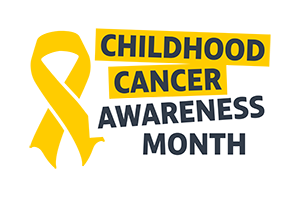Childhood Cancer Awareness Month – Meet Rachel Barrett to learn about nutrition and childhood cancer
It’s Childhood Cancer Awareness Month and to bring about awareness, St George’s are profiling just a few of the many incredible members of staff that are involved in paediatric cancer journeys.
How long have you worked at St George’s Hospital?
I have worked at St Georges for 14 years. Prior to this, I completed a PhD and then worked for 3 years at The Royal Children’s Hospital in Melbourne.
Tell me about your team and what you do to help children with cancer?
Studies show that a child who is well nourished is able to cope better with treatment, have reduced complications and is more able to fight infection (Gibson et al, 2010.) As a dietitian I make sure patients receive good nutrition throughout their cancer treatment. I see patients around the time of diagnosis to assess their baseline nutritional status and discuss the potential impact of treatment on their nutrition. Due to the cancer itself or due to the side effects of treatment my patients often find it difficult to meet their nutritional requirements. I provide evidence-based individualised dietary advice to help optimise their intake. Many of my patients need additional support; I therefore assess the need for, and manage the provision of, Oral Nutritional Supplements, Nasogastric Tube feeding and Parenteral Nutrition. To provide a high standard of care I work closely with the patients and their families, the oncology team, ward staff, pharmacists, psychologists and other members of the multidisciplinary team.
Why is children’s cancer awareness month important to you and your team?
Children’s cancer awareness month is very important as it helps increase awareness of the type of cancers that affect children and the impact this has on their lives and the lives of their families. Cancer awareness month also helps people understand the range of professionals involved in the care of patients with cancer. As a dietitian is gives an opportunity to highlight the importance of nutrition in the care of these patients and help campaign for improved provision of nutrition within the hospital. We are very fortunate to have just opened a new diet kitchen at St Georges that will help provide tailored diets for patients who require specific food such as when our paediatric oncology patients experience significant taste changes due to chemotherapy.
Children’s cancer awareness month also helps highlight symptoms to prompt earlier diagnosis, promote fundraising for essential research and charity work and to encourage people to either give blood and/or join a bone marrow register.
What do you enjoy most about working within our children’s cancer team?
I find my job very rewarding. It is a privilege to get to know patients and their families and to contribute towards their care at St Georges. At a time when so much is beyond a family’s control, it is often grounding for them to be able to discuss their child’s nutrition, especially when it can contribute so much to a feeling of normality and improve quality of life. I enjoy working with a wide range of professionals who have fantastic knowledge, expertise and experience in working with paediatric oncology patients and who genuinely care about each patient and their families.


